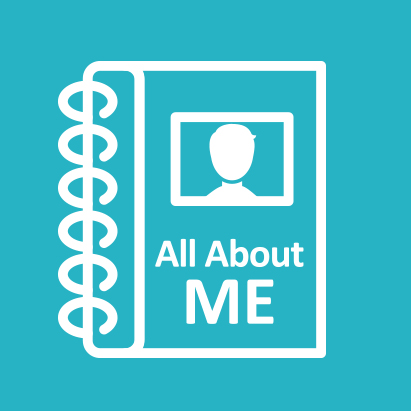Memory Books
 A memory book is helpful memory aid to a person with dementia. It is a note book, document, or poster that tells all about the person and their likes.
A memory book is helpful memory aid to a person with dementia. It is a note book, document, or poster that tells all about the person and their likes.
What YOU Can Do
If you have a friend or loved one with advanced dementia, make a memory book with and for them. This is different than a scrap book or a photo album. Think of a memory book as an aid to help the individual to remember better – like eyeglasses help people to see better, hearing aids help to hear better, and canes to walk better.
Losing the ability to remember names, words, and facts forces the memory impaired individual to rely on others in many situations. In a conversation, the person may not remember his daughter’s name and has to hope that he’s said enough about her that his conversational partner will know who he is talking about. He may rely on his spouse to fill in the appropriate names and words when he stumbles on them. With a memory aid, the memory-impaired individual can function independently.
Memory books can be conversation starters, act as memory triggers, be used in storytelling together, and if the person ever becomes unable to speak, the care partner can tell the stories of the Memory Book to the person with dementia.
How to Make a Memory Book
Use one phrase or sentence and one picture on each page.
Use white paper with large-print black lettering.
Place each page in a non-glare plastic page protector.
Use a three-ring binder with a clear pocket on the front.
Put a meaningful photo of the person’s choice on the cover.
For more information:
There’s More to the Person than the Dementia
If you talk to people who are living with dementia, they will tell you that they want to be treated by their friends, family and community, just as they were before their diagnosis. They are still the same people, with the same interests and desires, the same ability to love and be loved. They want to be accepted and they do not want to be pitied.
As the dementia progresses, people will require more care and assistance, and their communication skills will be affected. As the person becomes less able to communicate in their normal way it can be very easy to relate to them as if they are the disease. If you are a care partner, this usually happens because you are very focused on providing good care such as making sure they get out of bed, are clean, well dressed, eat their meals, are taking their medications. It’s easy to become wrapped up in the routine of completing care tasks. So, how can we good care partners and friends while focusing on the person, not the disease?
One thing we have found that helps is to create a note book, document, or poster that tells all about the person. Creating an All About Me document with the person who has dementia allows the people to communicate all of the important aspects of their lives such as their care preferences, food likes and dislikes, hobbies, names of friends and family, etc.
View and download a sample “All About Me” booklet:

Hand in Hand at Home
There are simple things you can do to transform your home into a supportive place that helps your loved one with dementia function better. We are going to show you just how to do it.
What is Dementia?
Dementia isn't a specific disease. Instead, dementia describes a group of symptoms affecting memory, thinking and social abilities severely enough to interfere with daily functioning.
Transforming Your Home
The best home environment is one that supports the abilities of the people living there.
Declutter
Understand the negative impact of clutter and take steps to improve the home environment.
Enhance Lighting
Simple changes in lighting can be made in the home to help your loved one function more independently and sleep better.
Support Memory
Create a memory center in your home to reduce confusion and foster wellbeing.
Communicate Effectively
Use a style of communication that is easier for the person with dementia to understand and follow conversations.
Understand Behaviors
Make sense of unexpected behaviors and learn how to prevent them.
Walking About
Tips for understanding and preventing walking about as well as information about how to choose a locating device.
The Power of Choice
Given them every opportunity to make informed choices about their care, leisure time, clothing, food and anything else that affects their life.
Power of Purpose
We all need a reason to get out of bed each day. People with dementia need to know their life has meaning and purpose.
Hiring Home Care
Learn how to ease the transition to additional care partners find out what questions to ask.
Self-Care
Advice for taking care of yourself, learning how and where to ask for help and scheduling breaks from caregiving.
Get Started!
You can do this! Take one step at a time. Follow these steps to get started.




